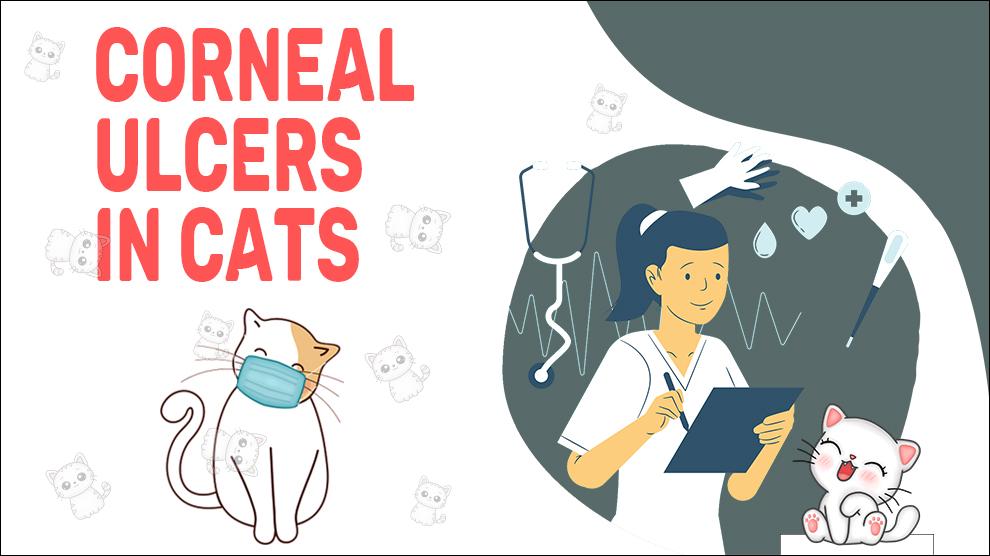What Is Corneal Ulcers In Cats?
Corneal ulcers are a common eye condition in cats that can cause pain, redness, and discharge.
They can be caused by a variety of factors, including injury, infection, or underlying health conditions.
Treatment may include medications, such as antibiotics or anti-inflammatory drugs, and may require additional procedures, such as debridement or surgery.
Preventative measures, such as keeping cats indoors and ensuring safe play and handling, can help reduce the risk of corneal ulcers.
Clinical Signs Of Corneal Ulcers In Cats
The symptoms of corneal ulcers can vary depending on the severity of the ulcer and the underlying cause.
Some common symptoms of corneal ulcers in cats may include:
- Eye Inflammation
- Squinting In Eyes
- Sensitivity to light
- Pawing at the affected eye
- Rubbing the face against surfaces
- Pain In Eyes
- Cloudy Eyes
- Excessive Blinking
- Redness In Eyes
- Mucus Discharge In Eyes
- Cloudy Cornea
- Loss Of Vision
- Redness In Eyes
If you notice any of these symptoms in your cat, it is important to seek veterinary care promptly.
Treatment Options For Corneal Ulcers In Cats
The treatment for corneal ulcers in cats may vary depending on the severity of the ulcer and the underlying cause.
Some common treatments may include:
- Topical medications, such as antibiotics or anti-inflammatory drugs, to prevent infection and reduce inflammation
- Oral medications, such as pain relievers or immune-modulating drugs, to address underlying health conditions
- Debridement, which involves removing dead tissue from the ulcer to promote healing
- Surgery, which may be necessary in severe cases or cases where the ulcer is not responding to other treatments
It is important to follow your veterinarian's recommendations for treatment and to provide any necessary follow-up care to ensure proper healing and prevent a recurrence.
Home Remedies For Corneal Ulcers In Cats
While it is important to seek veterinary care for corneal ulcers in cats, there are some home remedies that may provide temporary relief for your cat.
These remedies should not replace veterinary care but may be used in conjunction with prescribed treatments.
Some home remedies may include:
- Applying a warm compress to the affected eye to help reduce inflammation and discomfort
- Providing a low-stress environment to reduce anxiety and promote healing
- Ensuring proper nutrition and hydration to support overall health and healing
It is important to consult with your veterinarian before attempting any home remedies, as some remedies may actually exacerbate the condition or interfere with prescribed treatments.
How To Prevent Corneal Ulcers In Cats?
Preventing corneal ulcers in cats can be challenging, but there are some measures that can be taken to reduce the risk.
Some preventative measures may include:
- Keeping cats indoors to prevent exposure to environmental irritants and trauma
- Providing safe and appropriate toys and play areas to prevent injury
- Ensuring proper handling techniques to prevent trauma
- Regular veterinary check-ups to monitor for underlying health conditions
It is also important to monitor your cat's behavior and eye health closely and to seek veterinary care promptly if you notice any symptoms of corneal ulcers.
Affected Cat Breeds Of Corneal Ulcers
Corneal ulcers can occur in any breed of cat, but some breeds may be more predisposed to developing this condition.
These breeds include:
Additionally, cats with underlying health conditions, such as dry eye or herpesvirus infection, may be more susceptible to developing corneal ulcers.
Causes For Corneal Ulcers In Cats
Causes:
Corneal ulcers can be caused by a variety of factors, including:
- Trauma or injury to the eye, such as scratches, cuts, or foreign objects in the eye
- Infections, such as bacterial or fungal infections
- Underlying health conditions, such as dry eye or herpesvirus infection
- Excessive exposure to UV light or environmental irritants
- Abnormal eyelid anatomy or function, such as entropion or eyelid tumors
When To See A Vet For Corneal Ulcers In Cats?
If you notice any symptoms of corneal ulcers in your cat, it is important to seek veterinary care promptly.
Delaying treatment can lead to further damage and potentially permanent vision loss.
Additionally, if your cat has a history of eye problems or underlying health conditions, it is important to discuss preventative measures with your veterinarian to reduce the risk of corneal ulcers.
Food Suggestions For Corneal Ulcers In Cats
Proper nutrition is important for supporting overall health and healing in cats with corneal ulcers.
Some foods that may be beneficial for cats with corneal ulcers include:
- High-quality, protein-rich diets to support tissue repair and immune function
- Omega-3 fatty acids, have anti-inflammatory properties and may promote healing
- Foods rich in vitamins A and C, which are important for eye health and immune function
It is important to discuss any dietary changes with your veterinarian, as some foods may not be appropriate for cats with underlying health conditions or may interfere with prescribed treatments.
Additionally, ensuring proper hydration is important for supporting overall health and healing in cats with corneal ulcers.
Conclusion
Corneal ulcers are a common and potentially serious condition in cats, particularly in certain breeds and cats with underlying health conditions.
Symptoms can range from mild to severe and may include redness, discharge, squinting, and cloudiness of the eye.
Causes can vary and may include trauma, infection, underlying health conditions, and environmental factors.
Treatment typically involves a combination of medication, such as antibiotics and pain relievers, and supportive care, such as warm compresses and a low-stress environment.
Preventative measures, such as regular veterinary care, avoiding trauma to the eye, and ensuring proper nutrition and hydration, can help reduce the risk of developing corneal ulcers.
While home remedies may provide temporary relief, it is important to seek veterinary care for the proper diagnosis and treatment of corneal ulcers in cats.











